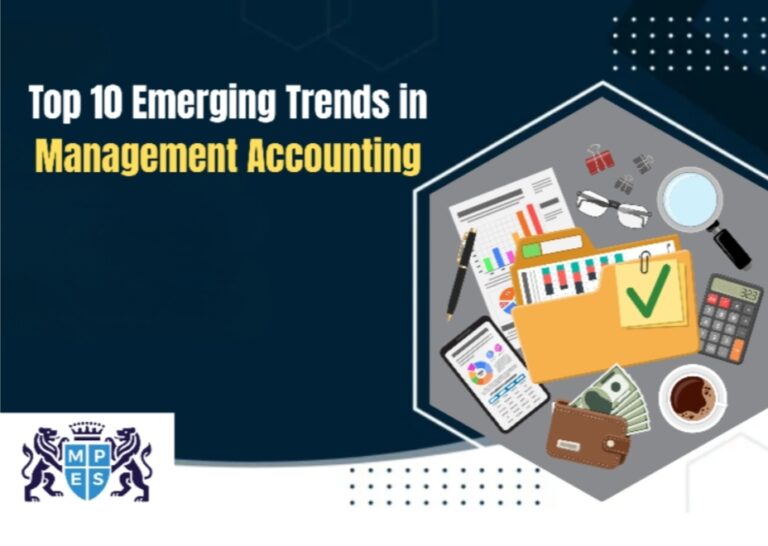Did you know that over 72 per cent of organisations have changed their management accounting practices in the past five years? This shift reflects how the field quickly evolves from routine reporting to strategic business guidance. With the ACCA Qualification, professionals are now equipped to understand not just What is Management Accounting but where it is heading. From automation to sustainability, the landscape is filled with new tools and expectations. In this blog, we break down the top 10 emerging trends in management accounting that are reshaping the role and adding real value to modern businesses.
Table of Contents
• Automation Is Replacing Repetition
• Cloud-Based Accounting Is the New Normal
• Data Analytics Is Driving Decisions
• Real-Time Reporting Is Gaining Ground
• Focus on Sustainability and ESG Metrics
• Skills Are Shifting Beyond Numbers
• Integrated Thinking Across Departments
• Agile Budgeting Is Replacing Annual Forecasts
• Cybersecurity Is a Growing Concern
• Artificial Intelligence Is Starting to Assist
• Conclusion
1. Automation Is Replacing Repetition
In the past, a significant portion of an accountant’s day was spent manually entering data. However, these days, everything from creating reports to processing invoices is done by automated technologies. Now, tasks that used to take hours can be completed in minutes with fewer mistakes. Because of this change, management accountants are now spending more time understanding the meaning of the figures rather than crunching them. Automation frees up brain space for deeper insights and better decision-making by decreasing repetitive tasks.
2. Cloud-Based Accounting Is the New Normal
Financial data is housed in spreadsheets and on-site servers. Thanks to cloud-based tools, teams may now collaborate in real time, wherever they are. This flexibility is perfect in hybrid work settings, where distant cooperation is common. It also maintains the security and centralisation of information. In terms of management accounting, this implies that choices are based on the most recent data, enhancing overall accuracy and responsiveness.
3. Data Analytics Is Driving Decisions
The days of accountants just looking backwards are long gone. Thanks to contemporary analytics tools, they may now assess performance, predict trends, and assist with real-time corporate planning. As a result of this transition, the management accountant now serves as a crucial strategic advisor. Professionals with an ACCA qualification assist organisations in making less reactive and more proactive decisions by recognising and analysing trends in the data.
4. Real-Time Reporting Is Gaining Ground
Outdated reports are not very useful in quickly changing markets. Because of this, dynamic reporting systems and real-time dashboards are now crucial. They offer real-time updates on financial health and critical performance metrics. This real-time visibility allows businesses to identify problems early and take swift action. Stakeholders no longer need to wait weeks to learn about their department’s performance.
5. Focus on Sustainability and ESG Metrics
Profit is not the only metric used to evaluate modern firms. ESG (Environmental, Social, and Governance) measurements are crucial for sustained growth. Monitoring and reporting on these values is a major responsibility of management accountants. They help ensure that monetary choices align with more general sustainability objectives. Businesses that follow this trend increase investor and customer trust and perform responsibly.
6. Skills Are Shifting Beyond Numbers
Nowadays, accountants should be able to do more than just balance books. Digital literacy, critical thinking, and communication are highly sought-after soft skills. This change is reflected in the ACCA Qualification, which covers various competencies outside of finance. Accountants must lead company strategy, interact across departments easily, and communicate complex facts in straightforward language.
7. Integrated Thinking Across Departments
Finance no longer functions in a vacuum. Management accounting now focuses on connecting the dots between departments. The purpose is to bring all departments, HR, sales, and operations, together with the same financial and strategic goals. Businesses can increase consistency and streamline operations with this holistic approach.
8. Agile Budgeting Is Replacing Annual Forecasts
The old-fashioned annual budget is no longer sufficient. The market moves too quickly. Agile budgeting is a more adaptable strategy that permits ongoing revisions. Companies can modify their expenditures in response to current demands and changing priorities. Leaders benefit from this trend by remaining flexible, particularly in unpredictable economic times.
9. Cybersecurity Is a Growing Concern
Financial systems are more susceptible to cyberattacks as they go online. To safeguard sensitive data, management accountants now collaborate closely with IT departments. This partnership protects bank records from fraud, breaches, and data leaks. Nowadays, security is more than simply an IT concern. It’s a joint obligation.
10. Artificial Intelligence Is Starting to Assist
Although AI in management accounting is still in its infancy, its influence is expanding. AI tools are making work faster and smarter, from identifying abnormalities to automatically organising transactions. But rather than replacing human judgment, these technologies supplement it. The best results are achieved when accountants utilise AI to improve their insights rather than to outsource their thinking.
Conclusion
Management accounting is no longer stuck in the past. It is bold, dynamic and ready to shape the future of business. If you want to understand these changes better or prepare for what is ahead, the ACCA Qualification is a smart step. For expert guidance and structured support, MPES Learning is here to help you stay one step ahead.
Enjoyed this? Share this post with fellow fans and influencers, and be sure to check back regularly for the latest updates, insights, and news on all things simpcity!

